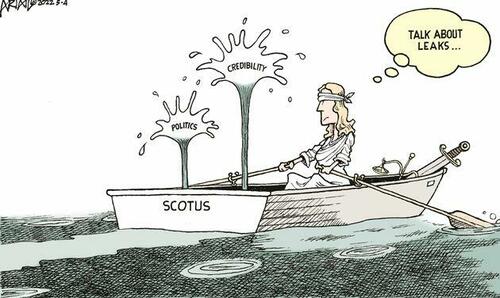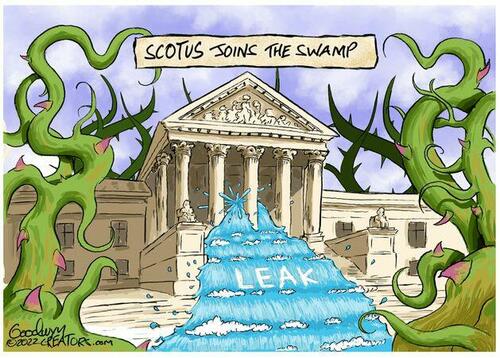
Below is my column in USA Today on the leaking of the draft opinion in Dobbs v. Jackson Women’s Health Organization. I previously discussed the “stench” raised by Justice Sotomayor and how it smelled like mendacity to blame her three new colleagues. Now that stench is overwhelming not only due to the intentional leaking of the opinion but the defense of the leaker by many in the press. The leaker is being called “brave” and a “hero” by many on the left. While denouncing what they see as the Court abandoning its principles, they are celebrating someone who violated every ethical and professional principle in leaking this draft opinion.
Here is the column:
Supreme Court Justice Sonia Sotomayor surprised many court watchers in December during the oral argument in Dobbs v. Jackson Women’s Health Organization when she complained about the “stench” of politics pervading the case over abortion rights.
The stench became overwhelming Monday night when Politico published a leaked copy of a working draft of the majority opinion in Dobbs.
Chief Justice John Roberts verified the draft’s authenticity Tuesday and launched an investigation.
The leak in the abortion case was a despicable act that shocked even the most cynical in Washington.
The draft opinion, if left unchanged, would sweep away Roe v. Wade and decades of precedent. The draft’s author, Justice Samuel Alito, declares, “We hold that Roe and Casey must be overruled. It is time to heed the Constitution and return the issue of abortion to the people’s elected representatives.”
This draft and the alignment of justices can change.
What will not change is that stench. The court has lost a type of institutional innocence in maintaining confidentiality through decades of hard-fought and heated legal disputes.
Court was island of confidentiality
Even in a city that floats on a rolling sea of leaks, the Supreme Court has long been an island of integrity and confidentiality. It was an inviolate rule that members and clerks do not leak either the deliberations or decisions of the court.
Indeed, for those of us who have covered and written about the nation’s highest court for decades, we never thought this day would come.
This was clearly a politically calculated act by someone who was willing to abandon every ethical and professional principle for a political cause. There is no obvious reason to leak other than to unleash outside pressure on the court and to try to push Congress to pass the Women’s Health Protection Act to codify Roe v. Wade.
If that was the purpose, it seems quickly realized as figures like Sen. Bernie Sanders, I-Vt., used the leak to call for not just the passage of the federal law but for killing the filibuster as well: “Congress must pass legislation that codifies Roe v. Wade as the law of the land in this country NOW. And if there aren’t 60 votes in the Senate to do it, and there are not, we must end the filibuster to pass it with 50 votes.”
It is doubtful the leaker expected to coerce a change in votes on the court. It is certainly true that a tentative opinion can change dramatically over the countless drafts sent between chambers. It is common for majority opinions to become dissents or to fracture in a plurality decision as justices work through the issues.
However, this leak makes such second thoughts less likely, not more.
According to Politico’s reporting, Alito was initially joined by Justices Clarence Thomas, Neil Gorsuch, Brett Kavanaugh and Amy Coney Barrett. Any change in the vote would now leave the impression that the court could be manipulated through outside pressure. Indeed, if Roberts was on the fence, this leak, if anything, might push him back toward the right of the court.
Faced with such a raw political act, justices are more likely to dig in than abandon their initial votes.
This leak was a move directed at Congress and the midterm elections. In some ways, that makes it even worse.
Politics is the forbidden fruit of judicial ethics. Yet it is a temptation that has been resisted through the years despite the Supreme Court being located across the street from Congress in the middle of a city where politics is the primary industry.
Injection of politics
Sotomayor’s complaint of the “stench” of politics in December was viewed by some of us as a departure from the decorum of the court. She was referring to how the three new members were widely viewed as having been nominated to reverse Roe and other cases by sheer force of numbers. It was itself the injection of politics into the deliberations.
Before the argument, Sotomayor shocked many in calling upon students to campaign against abortion laws in anticipation of pending abortion cases before the court. She declared in October, “You know, I can’t change Texas’ law, but you can and everyone else who may or may not like it can go out there and be lobbying forces in changing laws that you don’t like.”
It now appears that someone with access to internal deliberations of the court decided to find a way to be an instrument of change in a way that will leave a stench for many years to come. Few of us believe that any of the justices would countenance such an unethical act. The investigation instead will focus on the judicial clerks and staff of the court – an investigation that will shatter the court’s collegial and sheltered culture.
One thing is now certain. The court will never be the same. There is a loss of innocence in all of this, a realization that the court is no longer immune from politics.
It is a moment like the one described by physicist J. Robert Oppenheimer at the realization of the atomic bomb: “In some sort of crude sense which no vulgarity, no humor, no overstatement can quite extinguish, (we) have known sin; and this is a knowledge which (we) cannot lose.”
Below is my column in USA Today on the leaking of the draft opinion in Dobbs v. Jackson Women’s Health Organization. I previously discussed the “stench” raised by Justice Sotomayor and how it smelled like mendacity to blame her three new colleagues. Now that stench is overwhelming not only due to the intentional leaking of the opinion but the defense of the leaker by many in the press. The leaker is being called “brave” and a “hero” by many on the left. While denouncing what they see as the Court abandoning its principles, they are celebrating someone who violated every ethical and professional principle in leaking this draft opinion.
Here is the column:
Supreme Court Justice Sonia Sotomayor surprised many court watchers in December during the oral argument in Dobbs v. Jackson Women’s Health Organization when she complained about the “stench” of politics pervading the case over abortion rights.
The stench became overwhelming Monday night when Politico published a leaked copy of a working draft of the majority opinion in Dobbs.
Chief Justice John Roberts verified the draft’s authenticity Tuesday and launched an investigation.
The leak in the abortion case was a despicable act that shocked even the most cynical in Washington.
The draft opinion, if left unchanged, would sweep away Roe v. Wade and decades of precedent. The draft’s author, Justice Samuel Alito, declares, “We hold that Roe and Casey must be overruled. It is time to heed the Constitution and return the issue of abortion to the people’s elected representatives.”
This draft and the alignment of justices can change.
What will not change is that stench. The court has lost a type of institutional innocence in maintaining confidentiality through decades of hard-fought and heated legal disputes.
Court was island of confidentiality
Even in a city that floats on a rolling sea of leaks, the Supreme Court has long been an island of integrity and confidentiality. It was an inviolate rule that members and clerks do not leak either the deliberations or decisions of the court.
Indeed, for those of us who have covered and written about the nation’s highest court for decades, we never thought this day would come.
This was clearly a politically calculated act by someone who was willing to abandon every ethical and professional principle for a political cause. There is no obvious reason to leak other than to unleash outside pressure on the court and to try to push Congress to pass the Women’s Health Protection Act to codify Roe v. Wade.
If that was the purpose, it seems quickly realized as figures like Sen. Bernie Sanders, I-Vt., used the leak to call for not just the passage of the federal law but for killing the filibuster as well: “Congress must pass legislation that codifies Roe v. Wade as the law of the land in this country NOW. And if there aren’t 60 votes in the Senate to do it, and there are not, we must end the filibuster to pass it with 50 votes.”
It is doubtful the leaker expected to coerce a change in votes on the court. It is certainly true that a tentative opinion can change dramatically over the countless drafts sent between chambers. It is common for majority opinions to become dissents or to fracture in a plurality decision as justices work through the issues.
However, this leak makes such second thoughts less likely, not more.
According to Politico’s reporting, Alito was initially joined by Justices Clarence Thomas, Neil Gorsuch, Brett Kavanaugh and Amy Coney Barrett. Any change in the vote would now leave the impression that the court could be manipulated through outside pressure. Indeed, if Roberts was on the fence, this leak, if anything, might push him back toward the right of the court.
Faced with such a raw political act, justices are more likely to dig in than abandon their initial votes.
This leak was a move directed at Congress and the midterm elections. In some ways, that makes it even worse.
Politics is the forbidden fruit of judicial ethics. Yet it is a temptation that has been resisted through the years despite the Supreme Court being located across the street from Congress in the middle of a city where politics is the primary industry.
Injection of politics
Sotomayor’s complaint of the “stench” of politics in December was viewed by some of us as a departure from the decorum of the court. She was referring to how the three new members were widely viewed as having been nominated to reverse Roe and other cases by sheer force of numbers. It was itself the injection of politics into the deliberations.
Before the argument, Sotomayor shocked many in calling upon students to campaign against abortion laws in anticipation of pending abortion cases before the court. She declared in October, “You know, I can’t change Texas’ law, but you can and everyone else who may or may not like it can go out there and be lobbying forces in changing laws that you don’t like.”
It now appears that someone with access to internal deliberations of the court decided to find a way to be an instrument of change in a way that will leave a stench for many years to come. Few of us believe that any of the justices would countenance such an unethical act. The investigation instead will focus on the judicial clerks and staff of the court – an investigation that will shatter the court’s collegial and sheltered culture.
One thing is now certain. The court will never be the same. There is a loss of innocence in all of this, a realization that the court is no longer immune from politics.
It is a moment like the one described by physicist J. Robert Oppenheimer at the realization of the atomic bomb: “In some sort of crude sense which no vulgarity, no humor, no overstatement can quite extinguish, (we) have known sin; and this is a knowledge which (we) cannot lose.”








